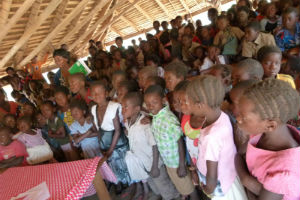UOIT Faculty of Education professors raise funds for Zambian rural schools
July 2, 2013

Two faculty members from the University of Ontario Institute of Technology’s (UOIT) Faculty of Education are heading up a committee for a fundraising and mentorship project between teacher candidates and rural schools in Zambia, Africa.
Initiated by Dr. Jennifer Laffier, Senior Lecturer, and Dr. Janette Hughes, Associate Professor, the Teachers for Teachers in Africa Committee (TFTA) raises funds every year to help schools in the Zambian villages of Chinema and Samafunda, which have a high number of orphans and vulnerable or high-risk children. Over the last two years, the committee has pledged up to $10,000 for these schools. The money goes toward the purchase of school supplies, teachers’ salaries, school repairs, the purchase of agricultural tools and seeds to teach children how to farm, as well as farm animals such as goats and cows.
The aim of the project is not only to fundraise, but also provide a mentorship/learning experience for teacher candidates in the Bachelor of Education program at UOIT. Teacher candidates on the committee are introduced to the topic of international teaching and explore themes such as culture, and child development and learning in developing countries. Teacher candidates can share teaching ideas, strategies and experiences with teachers in Africa. “There is no technology at the moment in the area so everything has to be done through mail,” said Dr. Laffier.
“This is a great way to develop awareness and skills as a student – it is experiential and activist learning. Social justice is a key component in the education program at UOIT. The students feel empowered that they can make a difference and they are learning through the process.”
Dr. Laffier first became connected with this project when she went to Zambia on her honeymoon in 2010. While there, she met fellow Canadian Robynne Anderson, Main Representative to the United Nations of the World Farmers Organisation. Upon hearing about Dr. Laffier’s work in the Faculty of Education, as well as her work as a child therapist, Anderson asked if she would like to be involved in the Manyinga Community Resource Centre - Orphan and Vulnerable Children schools project, which teaches children in developing countries about self-sustainable farming. After joining the Board of Directors for the Manyinga Community Resource Centre, Dr. Laffier approached Dr. Hughes in 2012 about starting a mentorship project between UOIT teacher candidates and the Zambian schools, and they developed the TFTA.
“The schools are located in a remote area of Zambia and have few supplies and teacher resources. In addition, teachers make as little as $1,500 a year,” explained Dr. Laffier. “But what is amazing about these schools is that even though they are non-state schools, the students are passing the state-wide exams into Grade 8 at a higher rate than other local schools. Not only are the students dedicated and inspiring, but the teachers are passionate about helping their local community and children. When asked what they liked about teaching, many teachers commented that they wanted to help the children have a better life or be good leaders in the future for their country.”
The student-led committee has raised money through many avenues, including toonie drives, bake sales, literacy bracelet sales, pub nights and social events with door prizes. The committee also held a summer camp where the Girl Guides of Canada came to UOIT to earn their science badges in return for a donation to the project. In May 2012, Dr. Hughes and some of her research colleagues organized a math concert at the Regent Theatre related to a research project they were involved in, featuring musicians such as Bob Hallett, from the popular Newfoundland band Great Big Sea. Donations have also come in from outside companies and organizations.
Dr. Laffier’s spouse’s company, Northern Dock Systems, now organizes an annual hockey tournament on behalf of the TFTA committee and has raised up to $2,000 per year. Student TFTA members have also done book readings with Dr. Hughes and anti-bullying presentations with Dr. Laffier in elementary and high schools in exchange for donations to the cause.
For the future, the committee is discussing the possibility of having students do some sort of practicum in Zambia, or creating a scholarship fund for the children. The teachers in Africa have also requested support in teaching English and Math, which are areas of focus at UOIT’s Faculty of Education.



